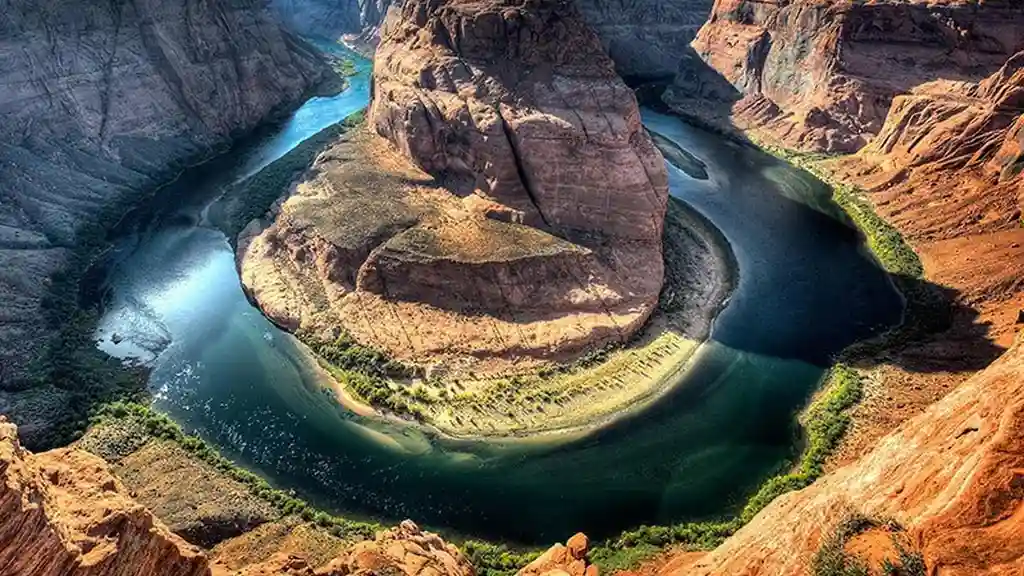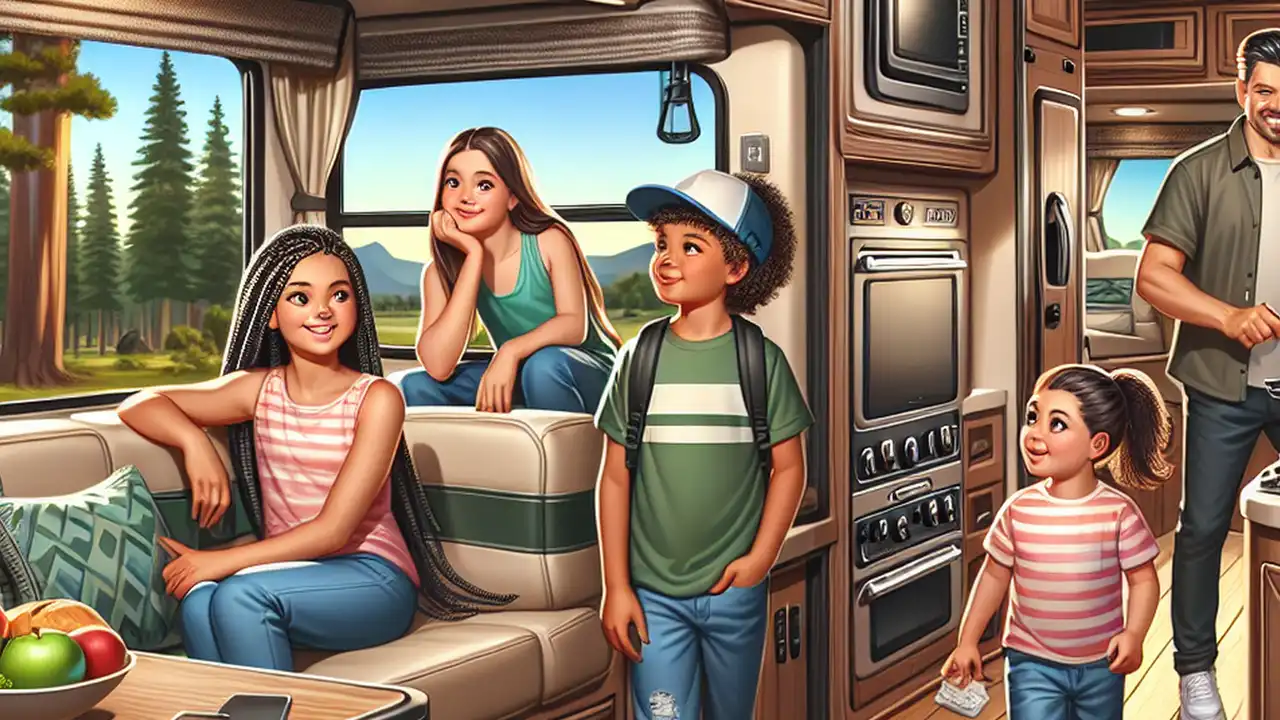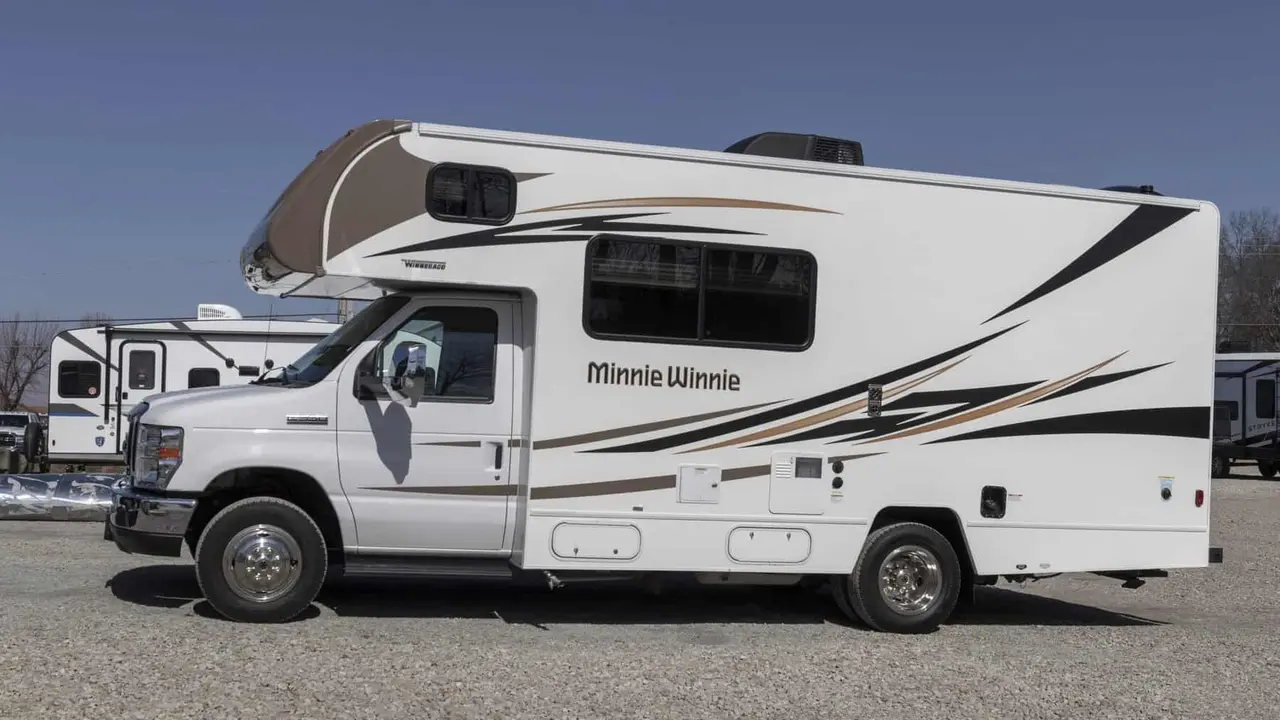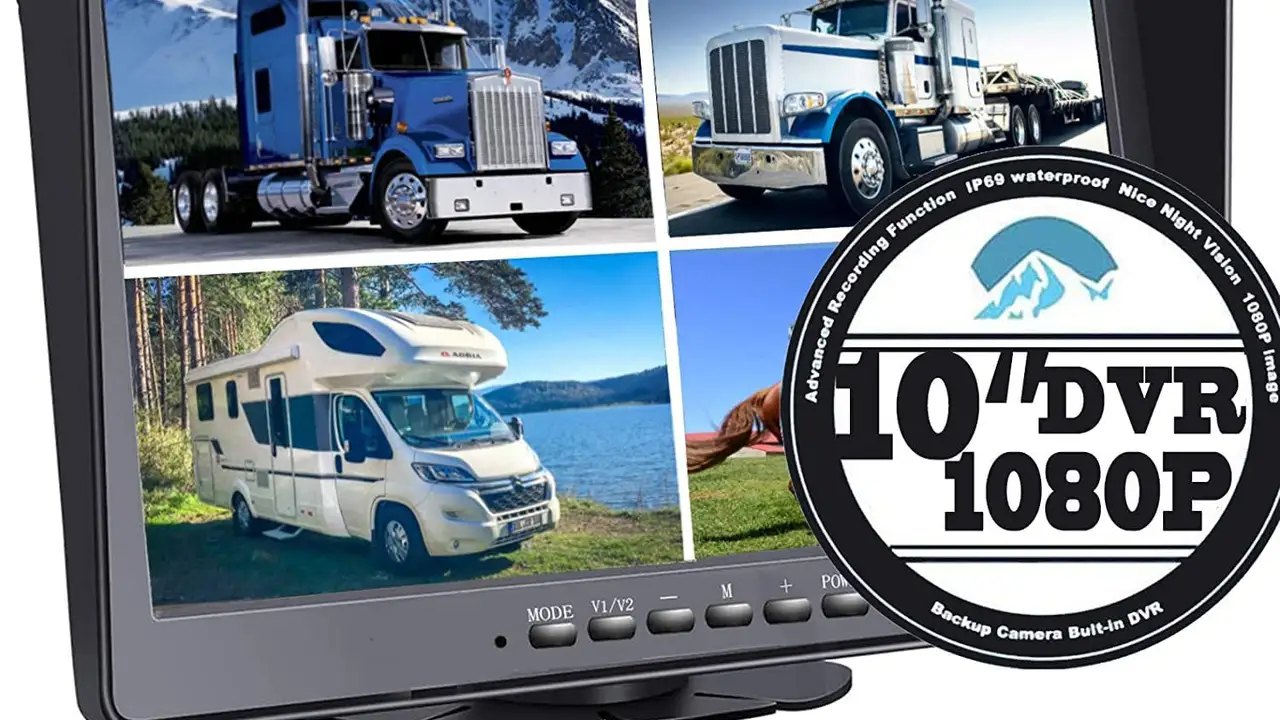RV Buying Mistakes to Avoid: Expert Advice
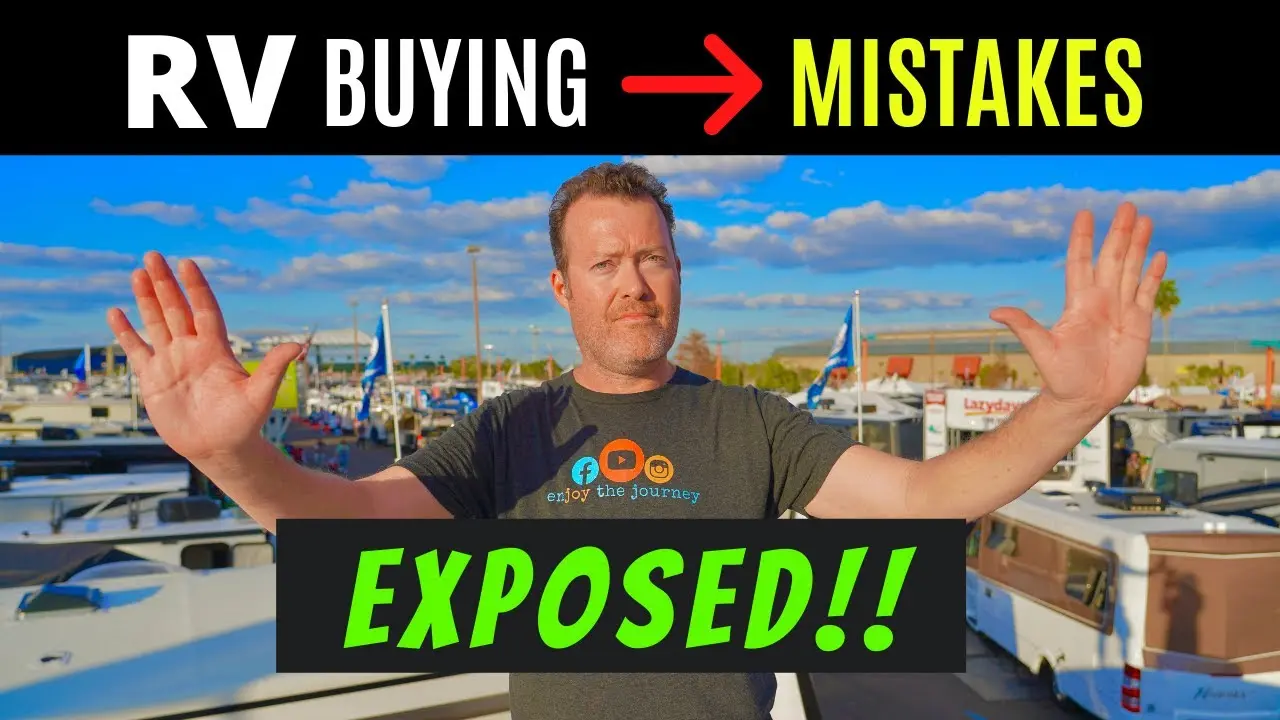
Understanding Your RV Needs and Lifestyle
So, you're thinking about buying an RV? That's fantastic! The open road, the freedom to explore, the cozy nights under the stars – it's a dream many of us share. But before you jump in headfirst, let's take a step back and really consider what you need from an RV. This isn't just about picking a shiny new toy; it's about finding a vehicle that fits your lifestyle and travel style like a glove.
Think about it: are you a weekend warrior, escaping the city for a few days of camping and hiking? Or are you planning a full-time adventure, hitting the road for months or even years at a time? Maybe you're somewhere in between, looking for a comfortable way to travel and see the country without the hassle of hotels and airports.
Your answers to these questions will drastically impact the type of RV you should consider. A small travel trailer might be perfect for weekend getaways, while a larger Class A motorhome might be necessary for full-time living. Let's delve deeper into some key considerations:
- How many people will be traveling with you? This is a crucial factor. A couple can comfortably manage in a smaller RV, but a family with kids will need more space and sleeping arrangements.
- Where will you be traveling? Are you planning on sticking to paved roads and established campgrounds, or do you want to venture off the beaten path? Some RVs are better suited for off-road adventures than others.
- What kind of amenities are important to you? Do you need a full kitchen, a bathroom with a shower, or a comfortable living area? These amenities will add weight and cost to your RV, so it's important to prioritize what's truly essential.
- What's your budget? RVs can range in price from a few thousand dollars to hundreds of thousands of dollars. It's important to set a realistic budget and stick to it. Remember to factor in not only the purchase price, but also the cost of insurance, maintenance, and fuel.
Once you have a clear understanding of your needs and lifestyle, you can start to narrow down your options and focus on the types of RVs that are a good fit for you.
Exploring Different Types of RVs and Their Benefits
The world of RVs is vast and varied, with a seemingly endless array of shapes, sizes, and features. Understanding the different types of RVs is crucial for making an informed decision. Let's take a look at some of the most common types:
Class A Motorhomes The Ultimate in Luxury and Space
Class A motorhomes are the kings of the road. These are the largest and most luxurious RVs, offering plenty of space, amenities, and comfort. They are built on a commercial bus or truck chassis and typically feature a full kitchen, bathroom, living area, and bedroom. Class A motorhomes are ideal for full-time living or extended travel.
Benefits:
- Spacious and comfortable: Class A motorhomes offer plenty of living space, making them ideal for families or couples who value comfort and convenience.
- Full amenities: They typically include a full kitchen, bathroom, living area, and bedroom, allowing you to live comfortably on the road.
- Powerful engines: Class A motorhomes are equipped with powerful engines that can handle long distances and steep inclines.
- Luxurious features: Many Class A motorhomes offer luxurious features such as leather seating, hardwood floors, and entertainment systems.
Example: The Winnebago Adventurer is a popular Class A motorhome known for its spacious interior, comfortable amenities, and reliable performance. It's a great choice for families or couples who want to travel in style and comfort. Pricing typically starts around $200,000.
Class B Motorhomes The Versatile Camper Van
Class B motorhomes, also known as camper vans, are smaller and more agile than Class A motorhomes. They are built on a van chassis and offer a more compact and fuel-efficient option. Class B motorhomes are ideal for solo travelers, couples, or small families who want to explore remote areas and enjoy a more minimalist lifestyle.
Benefits:
- Compact and fuel-efficient: Class B motorhomes are easier to maneuver and park than larger RVs, and they typically get better gas mileage.
- Versatile: They can be used for both camping and everyday transportation.
- Easy to drive: Class B motorhomes are generally easier to drive than larger RVs, especially in urban areas.
- Minimalist lifestyle: They encourage a more minimalist lifestyle, focusing on experiences rather than possessions.
Example: The Mercedes-Benz Sprinter Van Conversion (various models) is a popular choice for Class B conversions, offering a reliable platform and a wide range of customization options. Companies like Airstream, Winnebago, and Roadtrek offer pre-built Sprinter van conversions with various layouts and features. Pricing varies widely depending on the conversion, but typically starts around $100,000.
Class C Motorhomes The Perfect Blend of Size and Comfort
Class C motorhomes are a compromise between Class A and Class B motorhomes. They are built on a cutaway van chassis and offer a good balance of space, amenities, and affordability. Class C motorhomes are ideal for families or couples who want a comfortable RV without the high price tag of a Class A.
Benefits:
- Affordable: Class C motorhomes are generally more affordable than Class A motorhomes.
- Good balance of space and amenities: They offer a good amount of living space and amenities without being too large or cumbersome.
- Easy to drive: Class C motorhomes are generally easier to drive than Class A motorhomes.
- Over-cab sleeping area: Many Class C motorhomes feature an over-cab sleeping area, which provides extra sleeping space or storage.
Example: The Thor Motor Coach Chateau is a popular Class C motorhome known for its comfortable interior, reliable performance, and affordable price. It's a great choice for families or couples who want a comfortable and affordable RV. Pricing typically starts around $80,000.
Travel Trailers Towable Freedom and Flexibility
Travel trailers are towable RVs that are attached to a tow vehicle, such as a truck or SUV. They come in a wide range of sizes and layouts, from small pop-up trailers to large fifth-wheel trailers. Travel trailers are ideal for families or couples who want the flexibility to detach their RV from their tow vehicle and explore the surrounding area.
Benefits:
- Affordable: Travel trailers are generally more affordable than motorhomes.
- Flexible: They allow you to detach your RV from your tow vehicle and explore the surrounding area.
- Wide range of sizes and layouts: Travel trailers come in a wide range of sizes and layouts to suit different needs and preferences.
- Less maintenance: Travel trailers typically require less maintenance than motorhomes.
Example: The Airstream Bambi is a classic travel trailer known for its iconic design, durable construction, and comfortable interior. It's a great choice for couples or small families who want a stylish and reliable travel trailer. Pricing typically starts around $50,000.
Fifth-Wheel Trailers The Ultimate in Towable Luxury
Fifth-wheel trailers are a type of travel trailer that are attached to a tow vehicle using a special hitch in the bed of a truck. They are typically larger and more luxurious than conventional travel trailers, offering more space, amenities, and stability. Fifth-wheel trailers are ideal for families or couples who want a comfortable and spacious RV for extended travel.
Benefits:
- Spacious and comfortable: Fifth-wheel trailers offer plenty of living space, making them ideal for families or couples who value comfort and convenience.
- Stable towing: The fifth-wheel hitch provides a more stable towing experience than a conventional travel trailer hitch.
- Luxurious features: Many fifth-wheel trailers offer luxurious features such as fireplaces, entertainment systems, and gourmet kitchens.
- Separate bedroom area: Fifth-wheel trailers typically have a separate bedroom area, providing more privacy and comfort.
Example: The Grand Design Reflection is a popular fifth-wheel trailer known for its spacious interior, luxurious features, and durable construction. It's a great choice for families or couples who want a comfortable and stylish fifth-wheel trailer. Pricing typically starts around $60,000.
New vs Used RVs Weighing the Pros and Cons
Once you've decided on the type of RV that's right for you, you'll need to decide whether to buy a new or used RV. Both options have their pros and cons, and the best choice for you will depend on your budget, needs, and preferences.
Buying a New RV The Allure of Freshness and Warranty
Buying a new RV offers several advantages. You'll get the latest features and technology, a full factory warranty, and the peace of mind knowing that the RV hasn't been used or abused by previous owners. However, new RVs are also more expensive than used RVs, and they can depreciate quickly in the first few years.
Pros:
- Latest features and technology: New RVs typically come with the latest features and technology, such as advanced safety systems, energy-efficient appliances, and smart home integration.
- Full factory warranty: New RVs are covered by a full factory warranty, which can protect you from unexpected repair costs.
- Peace of mind: You'll have the peace of mind knowing that the RV hasn't been used or abused by previous owners.
- Customization options: You may be able to customize your new RV with your preferred colors, fabrics, and options.
Cons:
- Higher price: New RVs are more expensive than used RVs.
- Depreciation: New RVs can depreciate quickly in the first few years.
- Potential for initial issues: Even new RVs can have some initial issues that need to be addressed under warranty.
Buying a Used RV Saving Money and Finding a Gem
Buying a used RV can save you a significant amount of money. You can often find a well-maintained used RV for a fraction of the price of a new RV. However, used RVs may have some wear and tear, and they may not come with a warranty. It's important to thoroughly inspect a used RV before you buy it to make sure it's in good condition.
Pros:
- Lower price: Used RVs are significantly cheaper than new RVs.
- Slower depreciation: Used RVs depreciate more slowly than new RVs.
- Wider selection: You'll have a wider selection of RVs to choose from, including discontinued models.
- Opportunity to negotiate: You may have more opportunity to negotiate the price of a used RV.
Cons:
- Wear and tear: Used RVs may have some wear and tear, such as scratches, dents, and worn upholstery.
- No warranty: Used RVs may not come with a warranty, or the warranty may be limited.
- Potential for hidden problems: Used RVs may have hidden problems that are not immediately apparent.
- Outdated features: Used RVs may have outdated features and technology.
Financing Your RV Navigating Loans and Interest Rates
Unless you're paying cash, you'll need to finance your RV purchase. RV loans are similar to car loans, but they typically have longer terms and higher interest rates. It's important to shop around for the best loan terms and understand the total cost of the loan before you sign on the dotted line.
Understanding RV Loan Basics
RV loans are typically secured loans, meaning that the RV itself serves as collateral. The lender can repossess the RV if you default on the loan. RV loans typically have terms ranging from 5 to 20 years, and interest rates can vary depending on your credit score, the loan amount, and the lender.
Key Factors Affecting RV Loan Rates:
- Credit score: A higher credit score will typically qualify you for a lower interest rate.
- Loan amount: Larger loan amounts may come with higher interest rates.
- Loan term: Longer loan terms typically result in lower monthly payments, but you'll pay more interest over the life of the loan.
- Down payment: A larger down payment can reduce the loan amount and potentially lower the interest rate.
- Lender: Different lenders offer different interest rates and loan terms.
Tips for Securing the Best RV Loan
Here are some tips for securing the best RV loan:
- Check your credit score: Before you start shopping for RV loans, check your credit score and make sure it's in good shape.
- Shop around for the best rates: Compare interest rates and loan terms from multiple lenders, including banks, credit unions, and online lenders.
- Get pre-approved: Getting pre-approved for an RV loan can give you a better idea of how much you can afford and strengthen your negotiating position with the dealer.
- Consider a shorter loan term: While a longer loan term will result in lower monthly payments, you'll pay more interest over the life of the loan. Consider a shorter loan term if you can afford the higher monthly payments.
- Make a larger down payment: A larger down payment can reduce the loan amount and potentially lower the interest rate.
- Negotiate with the dealer: Don't be afraid to negotiate the price of the RV with the dealer. You may be able to get a lower price or better financing terms.
RV Loan Recommendation: Good Sam RV Loans
Good Sam RV Loans is a popular option for RV financing, offering competitive rates and flexible loan terms. They work with a network of lenders to find the best loan options for their customers. They also offer resources and tools to help you understand the RV loan process. Interest rates vary based on credit score and loan terms.
RV Insurance Protecting Your Investment on the Road
RV insurance is essential for protecting your investment and yourself while on the road. RV insurance policies typically cover damage to the RV, liability for accidents, and personal property coverage. It's important to understand the different types of RV insurance coverage and choose a policy that meets your needs.
Types of RV Insurance Coverage
Here are some of the most common types of RV insurance coverage:
- Collision coverage: Covers damage to your RV caused by a collision with another vehicle or object.
- Comprehensive coverage: Covers damage to your RV caused by events other than collisions, such as fire, theft, vandalism, and weather.
- Liability coverage: Covers bodily injury and property damage that you cause to others in an accident.
- Uninsured/underinsured motorist coverage: Covers your medical expenses and property damage if you're involved in an accident with an uninsured or underinsured driver.
- Personal property coverage: Covers your personal belongings that are inside your RV.
- Roadside assistance: Provides assistance if you experience a breakdown or other problem while on the road.
- Full replacement cost coverage: Pays the full replacement cost of your RV if it's totaled in an accident.
Factors Affecting RV Insurance Rates
Several factors can affect the cost of your RV insurance, including:
- Type of RV: Larger and more expensive RVs typically cost more to insure.
- Age and driving record: Younger drivers and drivers with a history of accidents or traffic violations typically pay more for insurance.
- Location: RV insurance rates can vary depending on your location.
- Coverage limits: Higher coverage limits typically result in higher premiums.
- Deductible: A higher deductible will typically result in a lower premium.
Tips for Saving Money on RV Insurance
Here are some tips for saving money on RV insurance:
- Shop around for the best rates: Compare rates from multiple insurance companies.
- Increase your deductible: A higher deductible will lower your premium, but you'll have to pay more out of pocket if you have a claim.
- Bundle your insurance: You may be able to get a discount by bundling your RV insurance with your home or auto insurance.
- Take a defensive driving course: Some insurance companies offer discounts to drivers who complete a defensive driving course.
- Maintain a good driving record: Avoid accidents and traffic violations to keep your insurance rates low.
RV Insurance Recommendation: Progressive RV Insurance
Progressive RV Insurance is a popular choice for RV owners, offering a wide range of coverage options and competitive rates. They also offer discounts for bundling, safe driving, and other factors. They have a user-friendly website and mobile app that make it easy to manage your policy. Premiums vary based on the type of RV, coverage limits, and other factors.
RV Inspection Checklist Ensuring a Safe Purchase
Before you finalize the purchase of an RV, whether it's new or used, it's crucial to conduct a thorough inspection. This will help you identify any potential problems or issues that could cost you money down the road. A comprehensive RV inspection checklist will cover all the major systems and components of the RV.
Exterior Inspection Points
- Body: Check for dents, scratches, rust, and other damage.
- Roof: Inspect the roof for leaks, cracks, and damage to the sealant.
- Windows and doors: Check for cracks, leaks, and proper operation.
- Tires: Inspect the tires for wear and tear, proper inflation, and age.
- Lights: Test all exterior lights, including headlights, taillights, brake lights, and turn signals.
- Awnings: Check the awnings for damage and proper operation.
- Storage compartments: Inspect the storage compartments for leaks, damage, and proper operation.
- LP gas system: Check the LP gas system for leaks and proper operation.
- Hitch (for travel trailers and fifth-wheels): Inspect the hitch for damage and proper operation.
Interior Inspection Points
- Appliances: Test all appliances, including the refrigerator, stove, oven, microwave, and water heater.
- Plumbing: Check for leaks in the sinks, toilets, and showers.
- Electrical system: Test all electrical outlets, lights, and appliances.
- Heating and air conditioning: Test the heating and air conditioning systems.
- Furniture: Inspect the furniture for wear and tear, damage, and proper operation.
- Cabinets and drawers: Check the cabinets and drawers for damage and proper operation.
- Sleeping areas: Inspect the mattresses and sleeping areas for comfort and cleanliness.
- Safety features: Check the smoke detectors, carbon monoxide detectors, and fire extinguishers.
Mechanical Inspection Points (Motorhomes)
- Engine: Check the engine for leaks, proper operation, and maintenance records.
- Transmission: Check the transmission for smooth shifting and proper operation.
- Brakes: Test the brakes for proper operation.
- Steering: Check the steering for smooth operation and proper alignment.
- Suspension: Inspect the suspension for wear and tear.
- Fluid levels: Check all fluid levels, including oil, coolant, brake fluid, and power steering fluid.
Professional RV Inspection Services
If you're not comfortable performing a thorough RV inspection yourself, you can hire a professional RV inspector. A professional RV inspector will have the expertise and equipment to identify potential problems that you might miss. Cost varies depending on the size and type of RV, but typically ranges from $500 to $1000.
Essential RV Accessories and Gear Equipping Your Home on Wheels
Once you've purchased your RV, you'll need to equip it with the essential accessories and gear to make your travels comfortable and enjoyable. The specific items you'll need will depend on your travel style and preferences, but here are some must-have RV accessories:
RV Leveling Blocks Ensuring Stability and Comfort
RV leveling blocks are essential for leveling your RV on uneven terrain. Leveling your RV is important for comfort, proper appliance operation, and preventing damage to the RV frame. Recommended Product: Andersen Levelers. Price: Around $70.
RV Wheel Chocks Preventing Unwanted Movement
RV wheel chocks are used to prevent your RV from rolling or moving while parked. They are especially important on sloped surfaces. Recommended Product: X-Chock Wheel Stabilizers. Price: Around $100.
RV Water Hose and Filter Ensuring Clean Drinking Water
A potable water hose and filter are essential for connecting your RV to a water source and ensuring that you have clean drinking water. Recommended Product: Camco Premium Drinking Water Hose and Camco TastePURE Water Filter. Price: Around $50 for the hose and $20 for the filter.
RV Sewer Hose and Fittings Handling Waste Responsibly
A sewer hose and fittings are necessary for emptying your RV's holding tanks. It's important to choose a high-quality sewer hose that is durable and leak-proof. Recommended Product: Valterra Dominator RV Sewer Hose Kit. Price: Around $70.
RV Electrical Adapters Connecting to Different Power Sources
Electrical adapters are needed to connect your RV to different power sources, such as 30-amp and 50-amp outlets. Recommended Product: Camco Dogbone Electrical Adapter. Price: Around $20.
RV Surge Protector Protecting Your Electrical System
A surge protector is essential for protecting your RV's electrical system from power surges and voltage fluctuations. Recommended Product: Progressive Industries EMS-PT30X Portable RV Surge Protector. Price: Around $150.
RV GPS Navigation Avoiding Low Clearances and RV Restrictions
An RV GPS navigation system is designed to help you navigate safely and efficiently in your RV. It takes into account the size and weight of your RV and avoids low clearances, narrow roads, and other restrictions. Recommended Product: Garmin RV 785 GPS Navigator. Price: Around $500.
RV Backup Camera Increasing Safety and Visibility
A backup camera can greatly improve your safety and visibility while backing up your RV. Recommended Product: Furrion Vision S Wireless RV Backup Camera System. Price: Around $400.
Maintaining Your RV for Longevity and Performance
Regular maintenance is essential for keeping your RV in good condition and preventing costly repairs. Proper maintenance will also help to extend the life of your RV and maintain its value. Here are some key RV maintenance tasks:
Regular Roof Inspections and Sealant Maintenance
Inspect your RV roof regularly for leaks, cracks, and damage to the sealant. Re-seal any areas that show signs of wear or damage. Recommended Product: Dicor Self-Leveling Lap Sealant. Price: Around $20 per tube.
Tire Maintenance Checking Pressure and Tread Depth
Check your RV tires regularly for proper inflation and tread depth. Replace tires when they are worn or damaged. Use a tire pressure gauge and a tread depth gauge.
Battery Maintenance Keeping Batteries Charged and Clean
Keep your RV batteries charged and clean. Check the battery terminals for corrosion and clean them as needed. Use a battery terminal cleaner and a wire brush.
Water System Maintenance Sanitizing and Winterizing
Sanitize your RV's water system regularly to prevent the growth of bacteria and algae. Winterize your RV's water system before freezing temperatures to prevent damage to the pipes. Use RV antifreeze for winterizing.
Appliance Maintenance Cleaning and Servicing
Clean and service your RV appliances regularly. Follow the manufacturer's instructions for cleaning and maintenance. Refer to your appliance manuals for specific instructions.
Regular Washing and Waxing Protecting the Exterior Finish
Wash and wax your RV regularly to protect the exterior finish from the elements. Use RV-specific wash and wax products.
RV Camping Etiquette Respecting Fellow Campers and the Environment
RV camping is a great way to enjoy the outdoors, but it's important to be respectful of your fellow campers and the environment. Here are some basic RV camping etiquette tips:
Quiet Hours Respecting Other Campers' Sleep
Observe quiet hours, typically from 10 PM to 7 AM. Avoid making excessive noise during these hours.
Pet Etiquette Keeping Pets Leashed and Cleaned Up
Keep your pets leashed and clean up after them. Be mindful of other campers who may not be comfortable around pets.
Campfire Safety Following Fire Restrictions and Guidelines
Follow campfire restrictions and guidelines. Never leave a campfire unattended and make sure it's completely extinguished before you leave.
Waste Disposal Disposing of Trash Properly
Dispose of your trash properly in designated receptacles. Recycle when possible.
Generator Use Minimizing Noise and Pollution
Use your generator sparingly and be mindful of the noise and pollution it creates. Consider using solar power or other alternative energy sources when possible.
Respecting the Environment Leaving No Trace Behind
Leave no trace behind. Pack out everything you pack in and avoid disturbing the natural environment.
Finding the Best RV Destinations and Campgrounds
One of the best things about owning an RV is the freedom to explore new destinations and campgrounds. There are countless RV-friendly destinations across the country, from national parks to private campgrounds. Here are some tips for finding the best RV destinations and campgrounds:
National Parks Experiencing Natural Beauty and History
National parks offer stunning scenery, abundant wildlife, and a variety of recreational activities. Many national parks have RV campgrounds, but reservations are often required well in advance. Popular National Parks for RVing: Yellowstone, Grand Canyon, Yosemite.
State Parks Exploring Local Gems and Natural Wonders
State parks offer a more affordable and often less crowded alternative to national parks. They also offer a variety of recreational activities and natural beauty. Check your state's park website for information on RV camping.
Private Campgrounds Amenities and Convenience
Private campgrounds offer a variety of amenities, such as swimming pools, playgrounds, and laundry facilities. They are often located near popular tourist destinations. Popular Private Campground Chains: KOA, Good Sam Parks.
Boondocking Dispersed Camping and Freedom
Boondocking, also known as dispersed camping, is camping in undeveloped areas without hookups. It's a great way to experience nature and escape the crowds. However, it requires careful planning and preparation. Check with the Bureau of Land Management (BLM) and the Forest Service for information on boondocking locations.
Using Online Resources and Apps Finding Campgrounds and Reviews
There are many online resources and apps that can help you find RV destinations and campgrounds, such as:
- Campendium: A comprehensive campground directory with reviews, photos, and amenities.
- Allstays: Another popular campground directory with a variety of search filters.
- RV Parky: A user-friendly app for finding RV parks and campgrounds.
- The Dyrt: A camping app with a focus on user-generated content.
The RV Lifestyle Embracing Freedom and Adventure
The RV lifestyle is more than just owning an RV; it's a way of life that embraces freedom, adventure, and the open road. It's about exploring new places, meeting new people, and creating lasting memories. Whether you're a weekend warrior or a full-time traveler, the RV lifestyle offers a unique and rewarding experience.
Benefits of RV Travel and Living
- Freedom and flexibility: The ability to travel wherever you want, whenever you want.
- Cost savings: Potentially lower travel costs compared to hotels and restaurants.
- Comfort and convenience: Having your own home on wheels with all the amenities you need.
- Connection with nature: The opportunity to spend more time outdoors and connect with nature.
- Community: The chance to meet other RVers and build lasting friendships.
Challenges of RV Travel and Living
- Maintenance and repairs: RVs require regular maintenance and can be prone to breakdowns.
- Space limitations: Living in a small space can be challenging for some people.
- Planning and logistics: RV travel requires careful planning and attention to detail.
- Weather conditions: RV travel can be affected by weather conditions, such as extreme heat, cold, or wind.
- Cost of ownership: RV ownership can be expensive, including the purchase price, insurance, maintenance, and fuel.
Tips for Enjoying the RV Lifestyle
- Plan ahead: Research your destinations and campgrounds in advance.
- Pack light: Only bring the essentials and avoid cluttering your RV.
- Be flexible: Be prepared to change your plans if necessary.
- Embrace the unexpected: Unexpected events can be part of the adventure.
- Connect with other RVers: Join RV clubs and online forums to meet other like-minded people.
:max_bytes(150000):strip_icc()/277019-baked-pork-chops-with-cream-of-mushroom-soup-DDMFS-beauty-4x3-BG-7505-5762b731cf30447d9cbbbbbf387beafa.jpg)



